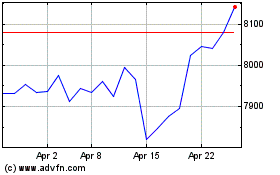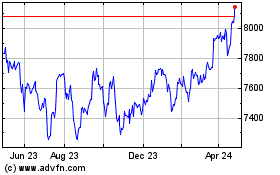By Will Horner and Gunjan Banerji
Fresh economic data and the viral outbreak in China fanned
worries about global growth, weighing on stocks around the world to
end the week.
The Dow Jones Industrial Average dropped 521 points, or 1.8%.
The S&P 500 slipped 1.6% and the tech-heavy Nasdaq Composite
fell 1.4%.
The World Health Organization on Thursday declared the
coronavirus -- which has now sickened more than 9,500 people and
killed over 200 -- a public-health emergency of international
concern. Although the move highlighted the risk the outbreak posed
globally, the WHO stopped short of recommending restrictions on
travel or trade. Meanwhile, the U.S. saw its first person-to-person
transmission of the virus, escalating concerns about its
spread.
The growing contagion has roiled markets in recent days as
investors attempt to assess whether the virus could weigh on
China's economy as businesses are shut, borders closed and flights
suspended, while also gauging the outbreak's wider impact.
"Everyone is a little bit in the dark," said Lars Kreckel,
global equities strategist at Legal & General Investment
Management. "But the conclusion for most is of a temporary hit to
Chinese GDP -- and so, a bit of a hit to global GDP -- but not
something that will derail global growth. A bump in the road."
The outbreak comes as some big manufacturers have exhibited
signs of strain, raising concerns about the economy. Caterpillar,
often considered a bellwether for the economy, said Friday it
expects demand for its machinery to fall this year, citing global
economic uncertainty that crimped sales in the latest quarter. Its
shares dropped 1.9% Friday.
Boeing earlier this week reported its first annual loss in more
than two decades, as one of its aircrafts has been grounded
world-wide. 3M, meanwhile, is planning layoffs during a global
restructuring.
One measure of business activity, the Chicago Business
Barometer, fell to its lowest point in around four years, hitting
42.9 and falling well below expectations. Readings under 50
indicate activity is contracting.
"It's been a tale of two economies," said Chris Zaccarelli,
chief investment officer for Independent Advisor Alliance.
Though manufacturing data has disappointed, the consumer seems
to be in better shape.
The University of Michigan's headline index of consumer
sentiment hit an eight-month high.
Fresh data released Friday showed that U.S. consumers continued
to spend in December, continuing a year-long trend. Household
spending rose a seasonally adjusted 0.3% in December from November.
Personal income advanced 0.2% last month. The spending figures were
in line with economists' expectations, while the personal income
number fell short of expectations.
The volatile week for stocks has been marked by even bigger
moves in shares of individual companies, particularly some
technology companies.
Amazon.com jumped 8.5% after the e-commerce giant's
fourth-quarter sales set a record for the holiday period. It is
poised to become the fourth U.S. company to close with a $1
trillion market value and close at a record.
Tesla's stock continued to soar after the electric-car maker
reported its third consecutive quarter of record vehicle
deliveries. Its shares jumped 10% Thursday though they edged lower
Friday.
International Business Machines rose about 3.8% after the
technology company said Chief Executive Ginni Rometty is stepping
down following a challenging eight-year run.
"There was a belief going into earnings season that expectations
of tech companies were so high that whatever happened, investors
would be disappointed," said Mr. Kreckel. "That hasn't
happened."
Elsewhere, the pan-continental Stoxx Europe 600 gauge fell 0.9%
while stocks in Asia were mixed. The Hang Seng Index closed 0.5%
lower, and exchanges in China remained shut.
New data on major European economies proved to be a
disappointment on Friday. France's output shrank in the fourth
quarter as strikes and protests against the government's pension
plan curtailed business activity. Italy's economy also contracted
in the latest quarter, when economists had been expecting output to
remain flat. The euro area also grew more slowly than economists
had forecast.
The weaker-than-expected European data suggests that any boost
to gross-domestic-product growth will take longer to materialize,
said Brian O'Reilly, head of investment strategy at the
Dublin-based Mediolanum International Funds.
"There was definitely a sense of euphoria that was priced into
the market," Mr. O'Reilly said. "But we are not expecting a rebound
in global GDP at least until the middle of this year. We think it
will just take time for confidence to build."
The U.K.'s FTSE 100 index dropped about 1.3% after the country
reported its first two cases of the virus. The number of people
sickened by the new coronavirus in China now exceeds the global
total infected with severe acute respiratory syndrome, or SARS,
which killed nearly 800 people after emerging from southern China
in late 2002 and spreading into 2003.
Write to Will Horner at William.Horner@wsj.com and Gunjan
Banerji at Gunjan.Banerji@wsj.com
(END) Dow Jones Newswires
January 31, 2020 12:57 ET (17:57 GMT)
Copyright (c) 2020 Dow Jones & Company, Inc.
FTSE 100
Index Chart
From Mar 2024 to Apr 2024

FTSE 100
Index Chart
From Apr 2023 to Apr 2024
